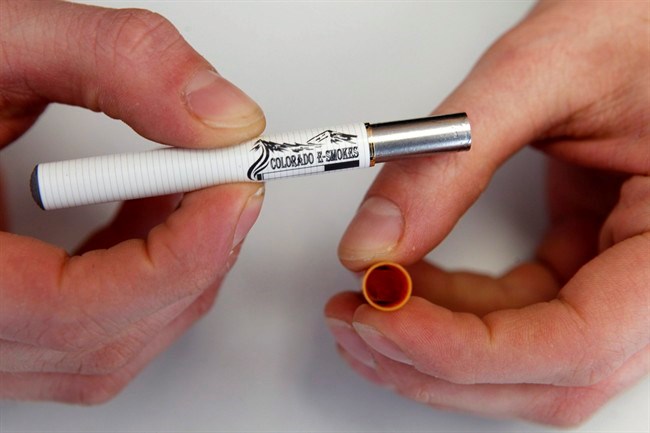New B.C. rules around the sale, promotion and use of e-cigarettes went into effect Thursday.
The changes limit sale of e-cigarettes to adults ages 19 years and older.
The legislation prohibits the sale of e-cigarettes in public buildings and bans their use on health authority properties except in designated smoking areas, on public and private school grounds, in indoor public spaces and workplaces, and in vehicles carrying youth 16 years and younger.
Amendments to the Tobacco and Vapour Products Control Act were designed to protect youth from the unknown effects of e-cigarette vapour and from becoming addicted to nicotine, the B.C. Health Ministry said.
E-cigarettes, or vapes, are so new that long-term effects have yet to be studied. But to date, the data suggest that some of the ingredients in the vapour released is carcinogenic.
Jenny Byford, of the B.C. and Yukon branch of the Canadian Cancer Society, applauded the law as a way to curb youth experimentation with e-cigarettes — e-cigarettes with nicotine could pose a health risk to the developing bodies and minds — and to protect all British Columbians from second-hand smoke exposure around public buildings.
Some health experts promote e-cigarettes, which contain nicotine but no tar, as a way for smokers to wean themselves off regular cigarettes.
Health Canada has not approved e-cigarettes as a smoking cessation aid.
The Canadian Cancer Society’s main concern with e-cigarettes is about the trending use among non-smoking youth when the product has no health benefit for non-smokers.
The growth in e-cigarette use is highest among young people. One in five youth in Canada has tried an e-cigarette, the B.C. Health Ministry said.
However, there’s push back from studies questioning how many youth are actually inhaling nicotine while advocacy groups and others fight laws limiting the use of e-cigarettes.
In April, the Canadian Vaping Association — a national group of advocates, retailers, manufacturers and distributors of the electronic cigarette industry — filed a constitutional legal challenge against a wide-ranging Quebec law that limits the use of electronic cigarettes.
And according to a U.S. survey, only a fraction of young vapers are inhaling nicotine. The majority — two-thirds — said they had vaped “just flavouring.”
Richard Miech, the study’s lead author at the University of Michigan, told the Associated Press that U.S. federal estimates of how many youths use any nicotine containing tobacco products — including traditional cigarettes, cigars, e-cigarettes — might be inflated because of mistaken assumptions about how much vaping involves nicotine.
Health officials and at least one advocacy group have questioned that study’s findings.
— With files from The Canadian Press and the Vancouver Sun



